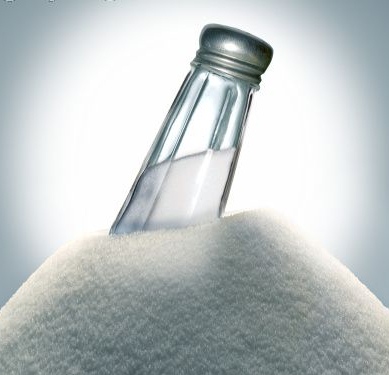
Heart Take Away: A diet too high in salt and too low in potassium doubles the risk of death from heart disease, according to a Center for Disease Control study led by researcher Elena V. Kuklina, M.D., Ph.D., a nutritional epidemiologist.
An out of whack sodium-to-potassium ratio seems to be a cause of premature coronary heart disease and stroke deaths. A sodium intake of 1,500 milligrams a day maximum and potassium intake of 4,700 milligrams a day is considered adequate (under current Dietary Guidelines) to maintain a healthy balance between the two. Remember, most excess salt is eaten in foods prepared outside the home.
If you need a potassium boost, eat more cantaloupe, oranges, grapes, grapefruit, blackberries, yogurt, dried beans, leafy greens, potatoes sweet potatoes, or bananas. I know, I know, I know. These foods may wreak havoc on low carb diets, but it's workable. Avoid increasing potassium with supplements; potassium from food is preferable for achieving balance.
Talking ratios reminds me that the Yale Heart Study, for which I have been burning the midnight oil, has reached the 30 percent mark in heart attack survivor participation but still needs (wow, this is a daunting number) 1,850 more heart attack survivors to share their experiences by April 2012. If you've had a heart attack and lived to tell about it please click here. Thanks to you, it will be possible to improve survival and quality of life.
But back to salt and potassium. The Salt Institute disagrees with Kuklina's study results, finding them "flawed" and revelatory of a "dogmatic anti-salt agenda."
Hmm.
Both high and low sodium have been linked to high blood pressure in previous studies. So has low potassium. Kuklina's study, published in the Journal of Internal Medicine, found the key to be in the ratio of sodium to potassium.
Kuklina and her colleagues followed 12,267 U.S. adult participants in the Third National Health and Nutrition Examination Survey from 1988 to 1994. Participants responded to questions about their diets and underwent physical exams.
None were on a reduced salt diet; those with a pre-existing history of stroke or heart problems were excluded. During the 15-year study, 2,270 people died, including 1,268 from cardiovascular disease.
Two more days, two more columns and I will have completed 29 heart health blogs in 29 days during American Heart Health Month. You're officially invited to continue reading and asking about heart health at the Yale Heart Study's Facebook page.
The third-to-last-time I'll be saying it: See you tomorrow.
Found Along the Way Department:
Medicare, the government health insurance program for Americans 65 and older, covers yoga for heart disease, according to CNN and The Huffington Post. Specifically, it covers the Ornish program (investigated and found excellent by Yale Heart Study), which teaches a plant-based, meatless diet, meditation and regular exercise. The program was officially declared an intensive cardiac rehab program in 2010, and the first patients started in May 2011.
Photos via Getty
---
 Heart attack survivors, please click here to take the Yale Heart Survey aimed at reducing the time victims delay before calling 9-1-1 or going to the hospital. If you haven't had a heart attack, click and forward to someone who has had one. Thank you.
Heart attack survivors, please click here to take the Yale Heart Survey aimed at reducing the time victims delay before calling 9-1-1 or going to the hospital. If you haven't had a heart attack, click and forward to someone who has had one. Thank you.
Evaluation of the Ornish diet provided by Megan Parmenter, Research Associate. Disclosure: Suzanne O'Malley is a Sr. Research Associate for the non-profit NIH-funded Yale Heart Study. Applications are open to her creative & screenwriting weekends & summer classes at Yale Writers' Conference & Yale Summer Film Institute.
For more by Suzanne O'Malley, click here.
